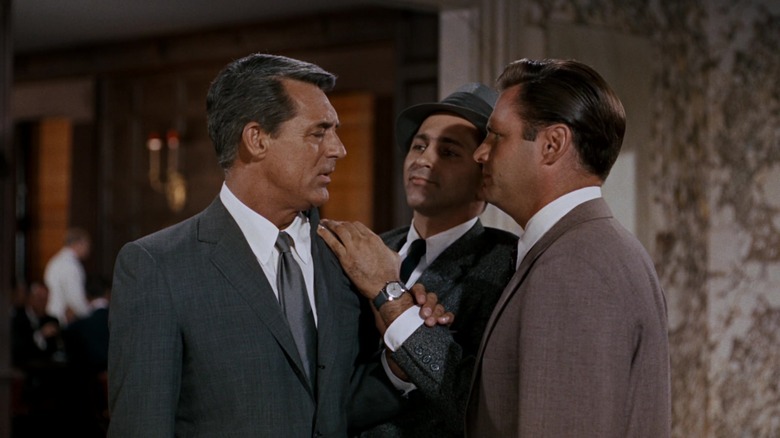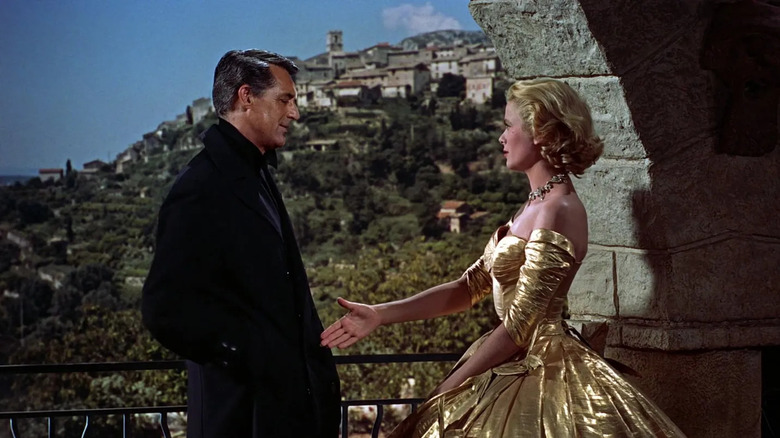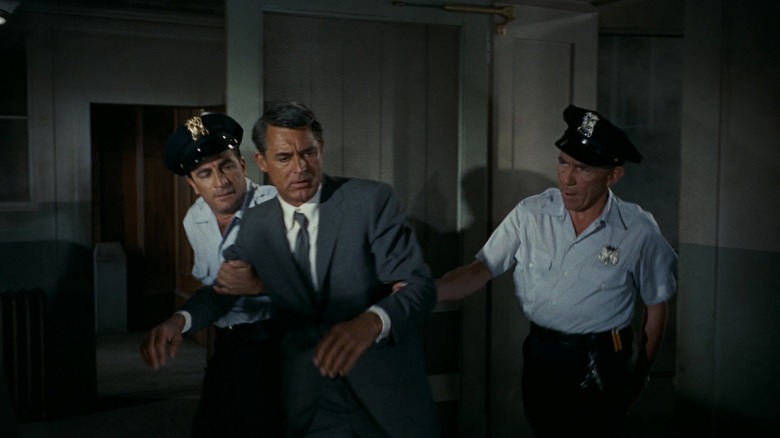Alfred Hitchcock Taught Cary Grant A Simple Trick To Keep The Mood Calm On Set
Although Alfred Hitchcock once famously said that "actors should be treated like cattle," the director may have actually been searching for on-set sheep. In other words, an animal that would be just as easy to herd around, but nevertheless wouldn't get too worried or agitated. Though Hitchcock was quite demanding, he also make it a point to avoid conflict on set — and one of his strategies to maintain the peace especially resonated with Cary Grant, who starred in several of Hitchcock's films.
While speaking to Interview, Grant recalled that Hitchcock would always attempt to diffuse tensions on set by reminding crew members that at the end of the day, the work they were doing wasn't all that high-stakes:
"A film's a film. As Hitch would say when someone would get all upset on the set, 'Come on, fellas, relax—it's only a movie.'"
As surprising as it might seem for a high-profile, famously controlling director to take such a nonchalant approach to his films' importance, it's pretty refreshing that the so-called master of suspense remained relatively humble. At the same time, it makes sense — and the nonchalant approach is probably what allowed Hitchcock to make so many hits (and duds). After all, if you aren't too worried about every little detail, it's easier to gamble with new techniques, many of which will either fail miserably or have a massive payoff.
Grant took Hitchcock's advice to heart
While Hitchcock's comments about a movie being just a movie may have seemed like a throwaway attempt to diffuse on-set tensions, Grant nevertheless had a great time working with the master of suspense. Looking back on their collaborations, the actor recalled that:
"I have only happy [memories]. They're all vivid because they're all interesting. It was a great joy to work with Hitch. He was an extraordinary man."
Of course, some of the other actors (or rather, actresses) did not always enjoy the same happy experience. Still, cultivating such a positive impression during the studio system's heyday — an era where movie production was practically like a factory assembly line and directors generally had less freedom — is still impressive.
As Grant and Hitchcock continued to work together, Grant seemed to internalize the director's nonchalant attitude about films. After a 2011 screening of "To Catch a Thief," the pair's third collaboration, actress Brigitte Auber recalled that Grant was very down-to-earth as soon as the cameras stopped rolling, a trait which would've made it far easier to keep tensions low and avoid on-set conflict. And while it's hard to know if Grant was naturally laid-back or became relaxed after spending time with Hitchcock, one thing's for sure: an easygoing personality made him a welcome addition to the director's set.
Things weren't always rosy behind the scenes
That all being said, Hitchcock's sets were far from utopia. Several of his biggest leading actresses have spoken up about sexual harassment, with Hitchcock even using live birds to attack Tippi Hedren in the finale of "The Birds" after she allegedly turned down his advances. Likewise, Hitchcock was not afraid to make his frustrations known, even going so far as to complain about things he didn't like in interviews.
However, true to Grant's comments, Hitchcock was careful not to make a scene on-set. Recalling his frustrations with actress Kim Novak on the set of "Vertigo," the director noted that:
"Miss Novak arrived on the set with all sorts of preconceived notions that I couldn't possibly go along with. You know, I don't like to argue with a performer on the set; there's no reason to bring the electricians in on our troubles. I went to Kim Novak's dressing room and told her about the dresses and hairdos that I had been planning for several months."
It's no surprise that Hitchcock wasn't a pushover, especially when he thought that an actor was taking away from his film. At the same time, his insistence upon a calm set almost feels as though it was mainly for the sake of avoiding drama — surely, there was already enough of that on the big screen.


